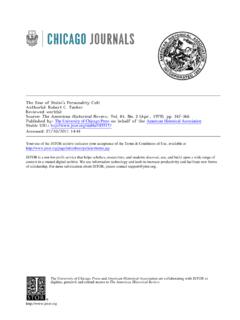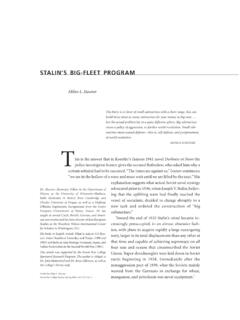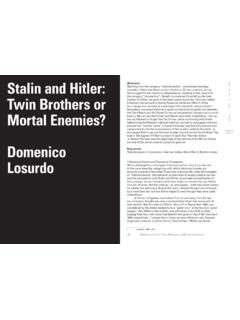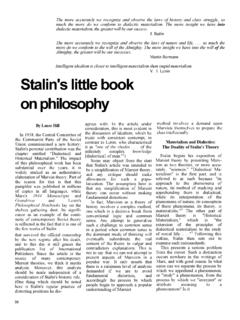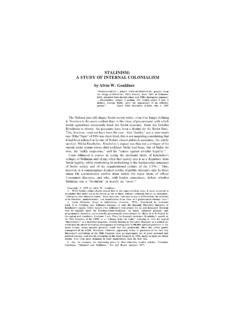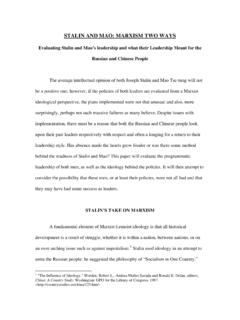Transcription of EUROPE 1 Alan Bullock Personality in History: Hitler and ...
1 EUROPE1914-45 The conservatives, having won round Hindenburg, thought thatthey could control the new government. There were only three Nazisin the cabinet: Hitler as Chancellor, Frick as Minister of the Interiorand Goering as Minister without Portfolio. Those responsible for thisaccession to power could not have envisaged the eventual fruits oftheir manoeuvres, the years of war and the gas chambers. HoweverHitler's anti-democratic intentions had already been made clear, notmerely inMein Kampf,which few of these aristocratic intriguers hadconsulted, but also in his speeches, and in the speeches of other Naziparty leaders.
2 The brutality of the Nazis was also already evidentfrom the street violence which they had fostered. There was noambiguity about the Nazis' intention of using democracy in order todestroy it. It seems equally clear that a large section of the Germanpopulation who voted for them, as well as important elements in theGerman establishment, had the same is this readiness to ditch democracy to be explained?Germany had undergone defeat, followed by traumatic economiccrises, both of which had undermined the legitimacy of the WeimarRepublic. But the rejection of democracy also reflects defects of theGerman political culture of the time.
3 Arnold Brecht, a Germanbureaucrat of the old school (who also happened to be a convincedSocial Democrat), wrote in his memoirs(The Political Education ofArnold Brecht)of 'the political immaturity, ignorance and short-sightedness of the average German citizen regarding the special riskof uncontrolled authoritarian government'. Spared the arbitrarygovernment and civil war of seventeenth-century England or theabsolutism of the Frenchancien regime,the Germans 'were entirelyblind to the dangers threatening their nation and themselves if theywere to transfer unlimited power to one man or group.
4 ' If Weimarhad some chances of survival before 1929, it had very little chanceafterwards, not just because of the Slump but also because of theattitudes and actions of the German electorate and their does not mean that Nazism was its inevitable came to power as a result of a miscalculation by conserva-tive politicians and the military after a large number, but by nomeans a majority of the electorate, had put it in a position to con-tend for power. Those who intrigued Hitler into power were opposedtoWeimar democracy and favoured a return to authoritarianism,but they neither wanted nor expected the triumph of Salmon lectures in history at the University of BullockPersonality in History: Hitler and StalinA perennial A-level dilemma is how to explain the rise of Hitler and Stalinand the horrors that were carried out under their rules.
5 Drawing on hisrecent research, Alan Bullock offers some of destinyThe motivation of both men was a passion to dominate, a need todominate, which they combined with a belief about themselvesthatthey were men of destiny, destined to playa great role in the both cases this belief was linked to a feeling about history . Stalinderived his sense of mission from an identification with the creedof Marxism-Leninism, a creed he believed had uncovered the lawsof historical development of which he was to be the too saw his destiny as a part of history . 'I often wonder,'he said, 'why the ancient world collapsed.
6 ' He thought the expla-nation was Christianity, the invention of the Jew,Saulof Tarsus,better known as St Paul, who had played the same disintegrativerole in the ancient world as Bolshevism, the invention of the Jew,Karl Marx, had in the modern. He saw himself having been born ina time of crisis similar to that of the ancient world, at a time whenthe liberal bourgeois order of the nineteenth century was disinte-grating and when the future would lie with the egalitarian Jewish-Bolshevik ideology of the Marxist-led masses, unless EUROPE couldbe saved by the Nazi racist ideology of the new elite which it washis mission to was quite open in what he had to say about himself.
7 Hespoke of himself confidently as a man called by Providence to raiseI do not believe that either Hitler or Stalin created the historicalcircumstances of which they were able to take advantage. Nor wasthere anything inevitable about the rise of either man. Neitherwould have succeeded had it not been for a stroke of luck. InStalin's case this was the unexpected death of Lenin at the early ageof 54; in Hitler 's the unexpected chance offered by the economicdepression which hit Germany with such force that it allowedhim to convert the Nazi vote of 800,000 in the election of 1928 toover 6 million in 1930, and to double that again to over 13 million AND STALING ermany from the humiliation of defeat in 1918 - the first stage ofre-creating a new racist empire in the east of EUROPE .
8 His great giftwas as a speaker, arguably the greatest demagogue in history . Noone has described the charismatic attraction someone like Hitlercould exercise on an audience better than Nietzsche, 11 years beforeHitler was born:Men believe in the truth of all that is seen to be strongly all great deceivers a remarkable process is at work to whichthey owe their power. In the very act of deception with all itspreparations, the dreadful voice, the expressions, the gestures,they are overcome by their belief in themselves and it is this beliefwhich then speaks so persuasively, so miracle-like to Nietzsche added: 'not only does he communicate that to theaudience but the audience returns it to him and strengthens hisbelief.
9 'Stalin's seizure of powerStalin presents an entirely different picture. At some stage, heformed the same conviction as Hitler that he was destined to play agreat role in history . Unlike Hitler , however, Stalin had to keep thisbelief to himself. The Bolshevik Party, as good Marxists, weredeeply hostile to anything like a cult of Personality . For Stalin toallow any hint to appear of his conviction that he had a historic roleto play would have been fatal to his Hitler had to create his own party and win mass supportin a series of open elections, Stalin had been carried into office bythe October Revolution of 1917, in which he played a minor role,and owed his subsequent promotion as General Secretary of theparty to Lenin's favour.
10 His chance came by an extraordinary pieceof luck when Lenin died in January 1924, at the early age of 54, justwhen he realised that he had made a mistake and was planning torevoke Stalin's appointment. The least fancied of the contestants forthe succession, Stalin possessed none of Hitler 's charismatic would have been counterproductive with the audience he hadtowin, the closed world of the central bodies of the SovietCommunist Party. Declaring that no one could take Lenin's place,he called for a collective leadership, in which he succeeded inestablishing his own claim to be, not Lenin's successor, but theguardian of his Stalin's hands this was enough to enable him to out-manoeuvrehis rivals (above all Trotsky) by accusing them of abandoningLeninist principles and branding them as guilty of factionalism andof dividing the party in pursuit of personal ambition.


